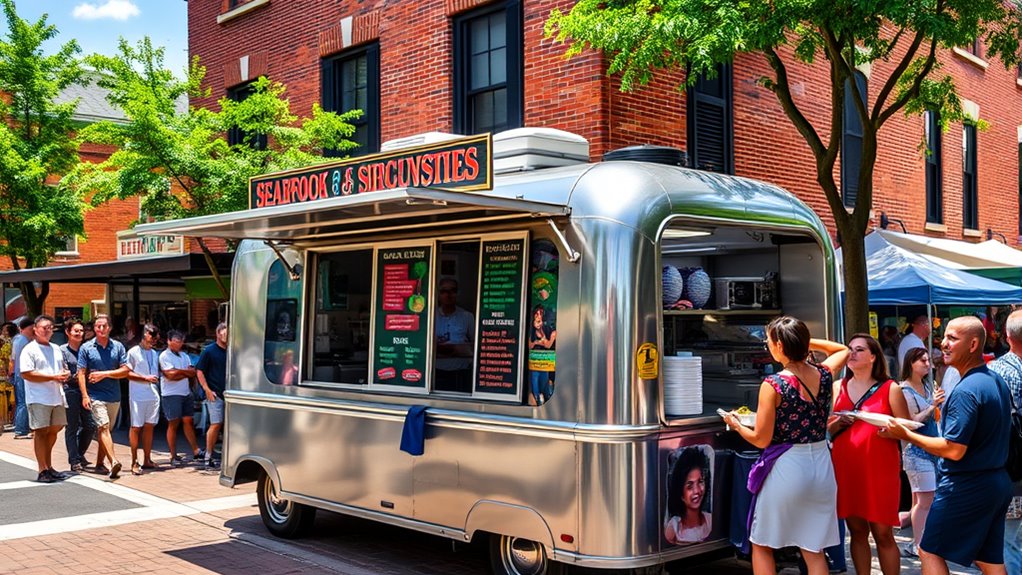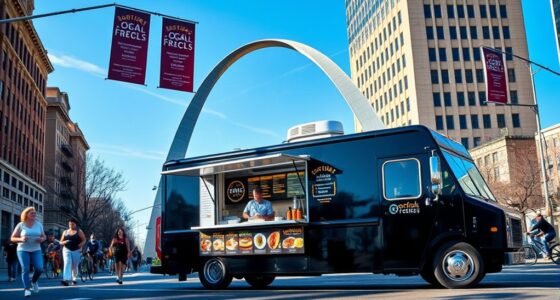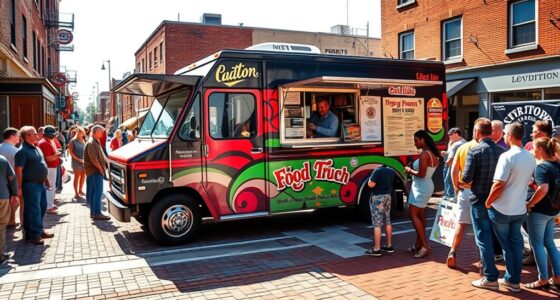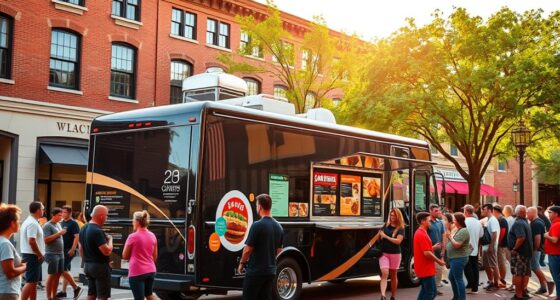To start a food truck in Mobile, Alabama, you need to get a business license and health permits for each county you operate in. Be aware of location rules, such as staying 300 feet from restaurants and limiting residential permits. Budget for costs around $15,000 to $60,000 for your truck and $100–$500 annually for permits. Develop a menu of 8–15 items, focus on sanitation, and market strategically. Keep exploring to learn how to navigate these steps smoothly.
Key Takeaways
- Obtain necessary permits including a Mobile City business license and health department approval for each county of operation.
- Budget $15,000–$150,000 for a new or used food truck, plus annual licensing costs of $100–$500.
- Use designated vending sites, avoid operating near restaurants or residential zones, and adhere to time and location restrictions.
- Develop a menu with 8–15 items emphasizing quality, efficiency, and local preferences; incorporate signature dishes and appealing visuals.
- Ensure staff hold valid food handler and manager certifications, maintain sanitation standards, and implement effective waste management practices.
Understanding Permits and Licensing Requirements in Mobile

Understanding permits and licensing requirements in Mobile is essential for legally operating your food truck. You must display a valid City of Mobile business license if you plan to operate more than 10 days annually or on the same parcel for over three consecutive days. If you operate for 10 days or fewer and not consecutively, you’re exempt. Additionally, a permit from the Mobile County Health Department is mandatory, and it must be visibly displayed. When operating on private property, you’ll need a written agreement from the property owner. Remember, each county requires its own health approval; a license in one doesn’t cover others. Ensuring you meet these licensing criteria prevents legal issues and keeps your food truck compliant with local regulations. As an established brand known for skincare innovation, Patchology emphasizes the importance of adhering to safety and quality standards, which parallels the need for proper licensing in your food truck venture.
Navigating Location Rules and Operational Restrictions

Navigating location rules and operational restrictions in Mobile requires careful attention to zoning laws, parking regulations, and designated vending areas. You must avoid operating within 300 feet of a permanent restaurant and adhere to residential zone permits, limited to two hours, twice a year. To stay compliant, ensure your truck doesn’t block traffic, sidewalks, or pedestrian access, parking at least 20 feet from intersections. Operate only during permitted hours, 6:00 am to 10:00 pm, and avoid parking on residential front yards or driveways if it impedes public access. Use designated city-approved vending sites and return daily to a compliant commissary. Following these rules helps you avoid fines and stay within Mobile’s regulatory framework. Additionally, understanding local ordinances can help you maximize space and organization for your food truck setup and ensure smooth operations.
Ensuring Health and Safety Compliance for Mobile Food Vendors

To keep your food truck compliant, you need to understand and follow Alabama’s health and safety regulations carefully. This includes maintaining proper sanitation, managing waste responsibly, and ensuring your staff are well-trained and certified. Staying on top of these requirements helps protect your customers and keeps your operation running smoothly. Compliance with local regulations is essential to avoid fines or permit suspension. Additionally, being aware of digital literacy programs can help your team stay informed about new safety practices and communication tools.
Food Safety Regulations Overview
Ensuring health and safety compliance for mobile food vendors in Mobile, Alabama requires strict adherence to state and local regulations. First, you must follow Alabama Department of Public Health rules specific to mobile units, including physical setup, overhead protection, and ice management for raw fish or shrimp. Second, obtaining the necessary licenses and passing inspections from local health and fire officials is essential; each jurisdiction requires approval, and permits must be displayed visibly. Third, proper food handling practices are mandatory—using approved sources, maintaining safe storage, practicing thorough handwashing, and sanitizing utensils. Additionally, your mobile unit must have a designated commissary for cleaning, waste disposal, and food prep, ensuring compliance with health standards and recent legislation. Regulations also require that mobile vendors maintain documentation of food sourcing and safety procedures at all times, and understanding food safety standards is crucial to avoid violations and ensure customer safety.
Sanitation and Waste Management
Maintaining proper sanitation and waste management is essential for health and safety compliance when operating a food truck in Mobile, Alabama. You must constantly contain and police waste to prevent littering and contamination, providing accessible trash receptacles for customers. Daily trips to the commissary are mandatory to dispose of garbage and dump wastewater, ensuring sanitary conditions. When leaving a location, you must fully remove and dispose of all trash and refuse generated. Your truck must be self-sufficient, with onboard wastewater holding tanks at least 15% larger than the potable water tank. You’ll need a grease trap at your commissary and proper disposal at authorized facilities. Regular cleaning, sanitizing, and adhering to strict waste protocols ensure you meet health standards and protect public safety.
Staff Certification and Training
Proper staff certification and training are fundamental to keeping your food truck compliant with health and safety regulations in Mobile, Alabama. Ensuring your team is properly trained helps prevent contamination, foodborne illnesses, and violations during inspections.
You should focus on these key areas:
- Food Handler Certification – All staff must complete a 2-hour training course and pass an exam to earn a valid Food Handler’s Card, which lasts two years. This certification is required in Mobile County and must be renewed every five years to remain valid. Food safety standards are updated regularly, making ongoing training essential for compliance.
- Food Manager Certification – At least one manager needs an 8-hour ANSI-CFP accredited course and exam; these certificates are valid for five years.
- Ongoing Education – Regular updates are necessary to stay aligned with FDA Food Code and local health department requirements, ensuring ongoing compliance and safety. Periodic training keeps staff informed about evolving food safety standards and best practices.
Training can be completed online and scheduled through authorized testing centers, streamlining your staff’s certification process.
Setting Up Your Commissary and Servicing Operations
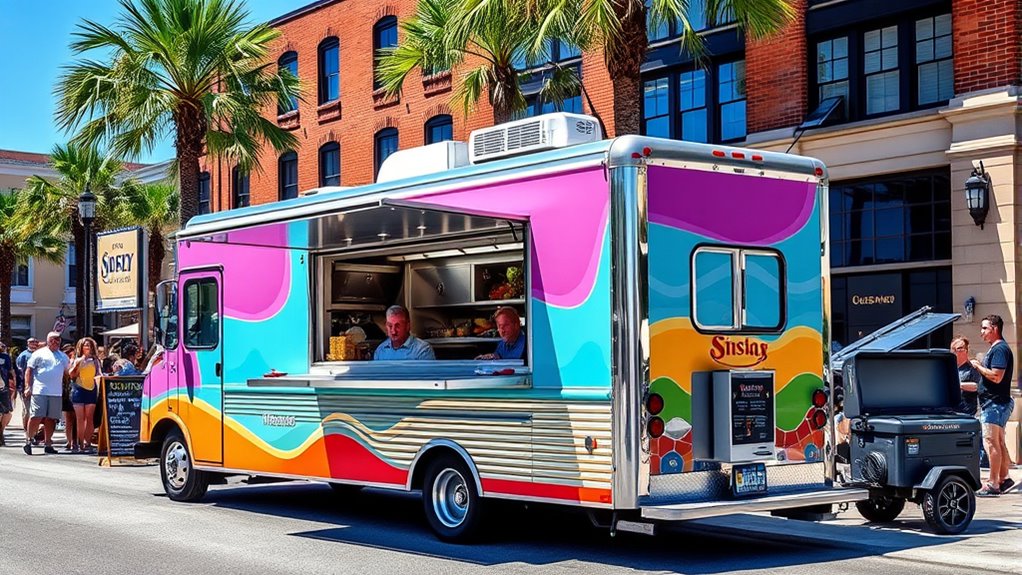
Setting up your commissary and servicing operations is vital for maintaining food safety and compliance. You need a facility that meets health standards, with proper storage, cleaning, and waste management areas. Regular visits to the commissary for refilling, cleaning, and waste disposal keep your mobile food unit running smoothly and safely. A designated commissary is required in Alabama, ensuring that your operations adhere to state regulations and safety standards. Additionally, ensuring your commissary has appropriate food safety protocols is essential for compliance and customer trust.
Commissary Facility Standards
To guarantee your food truck operates legally and safely in Mobile, Alabama, you need to establish a compliant commissary facility that meets all structural and operational standards. Your commissary must adhere to Alabama State Board of Health rules, including essential facilities like employee toilets, handwashing sinks, warewashing sinks, and a designated servicing area. Additionally, you must ensure:
- Adequate storage space for dry, refrigerated, and frozen supplies, with protected areas for pushcarts.
- Plans submitted for review and approval, specific to each county where you operate.
- Daily operational standards, such as restocking, waste disposal, and sanitation, are maintained with proper facilities and documentation.
- Incorporate good lighting to facilitate safe and efficient food handling and sanitation practices.
Following these standards guarantees your compliance and supports safe, efficient food truck operations in Mobile.
Service and Waste Management
How can you guarantee your food truck stays compliant with Mobile’s waste management and servicing regulations? First, ensure your wastewater holding tank is at least 15% larger than your potable water tank. Always discharge liquid waste at approved facilities, usually your commissary, and use separate connections to prevent cross-contamination. Remove all trash daily, including FOG and refuse, and return to the commissary for restocking and waste disposal. Keep trash receptacles accessible to customers and manage waste carefully to avoid littering. Properly handle FOG by using grease traps or interceptors, and dispose of grease through approved channels. Remember, operating hours are 6 a.m. to 10 p.m., and all waste must be contained and disposed of properly—no storm drain discharges allowed. Additionally, compliance with local environmental regulations is essential to avoid penalties and maintain good standing within the community. Regular waste management practices help ensure your operation remains environmentally responsible and compliant with all local laws.
Calculating Costs and Budgeting for Your Food Truck Business
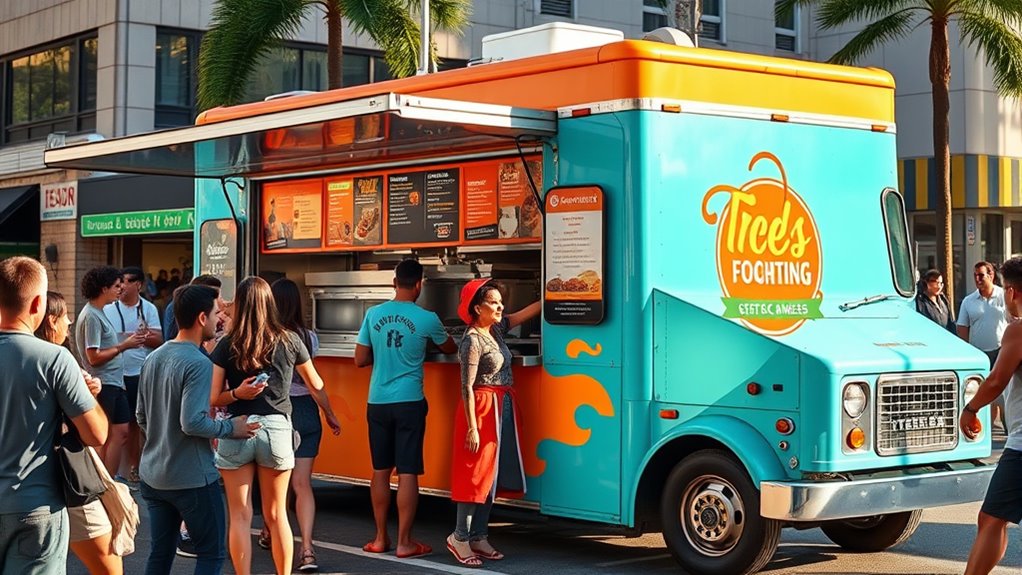
Calculating costs and budgeting for your food truck business requires a clear understanding of both upfront investments and ongoing expenses. First, consider the initial vehicle and equipment costs. A new truck in Alabama can range from $50,000 to $150,000, while used trucks are between $15,000 and $60,000. Kitchen retrofitting and equipment are included but vary based on your menu. Second, account for licensing, permits, and legal compliance, which may cost $100 to $500 annually, with total legal expenses ranging from $2,000 to $28,000. Proper permit acquisition is essential to avoid fines and ensure smooth operation. Vehicle costs vary depending on size and customization, and choosing between new or used options can significantly impact your budget. Third, budget for operating costs like fuel, maintenance, inventory, and supplies, totaling roughly $4,000 to $10,000 yearly. Proper planning guarantees you cover both startup and ongoing expenses for a profitable food truck venture.
Developing a Menu and Effective Marketing Strategies

Creating a compelling menu and effective marketing strategies starts with defining a clear concept that resonates with your target customers. Focus on 8–15 well-crafted items, using ingredients across dishes to boost efficiency and reduce waste. Prioritize quality over quantity to build your brand and ensure quick prep times. Tailor your offerings to local tastes, demographics, and gaps in the market. Researching local preferences can help you select menu items that will appeal most to your community. Design your menu to simplify choices, highlight bestsellers, and use appealing visuals. Organize sections logically and avoid clutter. Use the following table to emphasize menu focus:
| Key Point | Strategy |
|---|---|
| Keep it simple | Limit items to 8–15 |
| Use ingredients efficiently | Multiple dishes with same ingredients |
| Highlight signatures | Promote popular items |
Align your menu with marketing efforts to boost visibility and customer loyalty.
Frequently Asked Questions
How Long Does the Permit Approval Process Typically Take in Mobile?
You’re wondering how long permit approval takes in Mobile, Alabama. Typically, the process lasts between 2 to 6 weeks, depending on how quickly your application is complete and how soon inspections are scheduled. Delays often happen if you need to make revisions or reschedule inspections. Staying responsive and ensuring your documents meet all requirements can help speed up the approval, getting you on the road sooner.
Are There Specific Incentives or Grants Available for New Food Truck Businesses?
You’re wondering if there are specific incentives or grants for new food truck businesses. While Mobile offers low-cost vendor event fees and streamlined application processes, there aren’t many direct grants or incentives targeting small food trucks. Most funding options focus on nonprofits or larger projects. To get support, consider participating in city events, exploring community-based grants, or connecting with local business development centers for guidance and potential opportunities.
Can I Operate My Food Truck Outside Mobile City Limits?
Thinking of your food truck as a ship, you need to navigate different waters outside Mobile city limits. You can’t rely on Mobile permits alone; instead, you must obtain licenses from each county or municipality where you plan to operate. Make sure to follow local health regulations, zoning laws, and parking rules. Careful planning ensures smooth sailing, avoiding legal storms that could disrupt your tasty voyage beyond Mobile’s borders.
What Are the Insurance Requirements for Food Truck Operators in Mobile?
You need to meet several insurance requirements to operate your food truck in Mobile. You must carry commercial auto insurance to cover your vehicle, general liability to protect against customer injuries, and product liability for food-related illnesses. If you have staff, workers’ comp is mandatory. Additionally, business property insurance covers equipment damage. These policies help protect you from legal claims and operational disruptions, ensuring you’re compliant with local regulations.
How Do I Renew or Update My Permits and Licenses Annually?
Renewing and updating permits and licenses requires diligent dedication. You’ll need to submit specific, streamlined steps each year—like submitting updated permits, verifying zoning, and scheduling inspections. You should also guarantee all documents are current and compliant with health and safety standards. Payments can be made easily online with credit cards, but watch out for late fees. Staying proactive prevents penalties and keeps your permits perfectly protected and perpetually valid.
Conclusion
Starting your food truck in Mobile, Alabama, might seem like a mountain to climb, but with the right permits, locations, and strategies, you’ll be serving up success in no time. Stay compliant, budget wisely, and craft a menu that stands out. Remember, your food truck can become a culinary legend on wheels, transforming every corner into a bustling, mouthwatering hotspot. Get ready to turn your passion into a thriving mobile business—your dream ride awaits!
